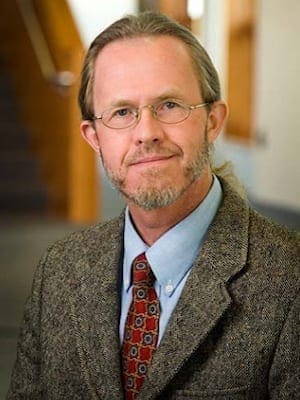“Cynic,” and its derivatives, is surely among the biggest “diss” words of this wartime era. While cynicism is real and dangerous, charges of such occur regularly in conversation and print as a means of dismissing the socio-political critique or queries of those less than enamored by the current U.S. administration and its allies.
Some recent headlines serve as examples: “Bush critics are cynics without a cause,” “‘Cynics’ blasted by Blair,””Teen gets an earful on Iraq.”
The “cynicism” confessions of Ted Koppel and some other critics have only muddied the semantic waters.
As a pastor and patriot without stars in my eyes for the U.S. president and with many unanswered questions about Bush’s war and other policies, I want to note the critical difference between the social critic and a true cynic.
The term “terrorist” is being used with greater frequency as a means of labeling opponents. The “T” word has been used with more than dismissive intent and with near reckless abandon during recent years. It designates not only those relatively few persons internationally–who may in fact be the epitome of cynicism–but also many others, whose ethnicity, religion politics or appearance elicit labeling merely on grounds of suspicion.
Just noting this phenomenon is not an act of cynicism, however, as some of the president’s loyalists like to label it. The analysis of “terrorist” nomenclature emerges out of a critical consciousness. It may be a skeptical criticism or a critical skepticism, but it is not cynicism. The distinction is critical.
A cynic is one who has lost hope in humanity, if not necessarily in the divine. It is a state of utter distrust, a lack of faith in the integrity of other persons. In ancient Greece, Cynicism was an actual school of philosophers, a guild founded by Antisthenes. The Cynics were noted more for their contemptuous attitudes than for their love of wisdom.
Cynics also live among us today, but they are not necessarily those who wonder aloud about U.S. or U.K. economic reasons for being in Iraq. They are not the ones who raise questions about Halliburton contracts and vice-presidential cronyism or suggest that Bush extended-family system dynamics may be at work in Washington such that we are at war in Iraq. These are the queries of critics, not cynics. There is a difference.
Reinhold Niebuhr was a very young, 20-something pastor when he journaled his experiences of urban ministry in Detroit. The journals he kept during those early 20th century years were published later as the classic Leaves from the Notebook of a Tamed Cynic. Niebuhr’s congenital genius enabled early insight as to both the dangers of pastoral cynicism and the means of avoiding that pitfall. It happens; even, or especially, church leaders may lose hope and trust. Cynicism is real, and none of us is immune from becoming hopeless, distrustful, contemptuous cynics. Especially in an era like Niebuhr’s, and now ours, of national/international agitation, it is possible for the distraught to succumb to the cynic’s plight.
But questioning is not a symptom of cynicism. The true cynic no longer questions or even cares to. The cynic “knows” that all politicians are corrupt and that their every action is motivated by greed. The cynic is certain. It is the critic who queries. This is how the young Pastor Niebuhr “tamed” his cynical tendencies when encountering ecclesial frustrations and national or international conflagrations. He questioned and critiqued the actions of others, and then his own as well.
I read Niebuhr and am prone to his temptations. But in a mostly “tamed” condition, I also worry about these increasingly frequent charges of “cynicism” lodged against those who question the war or other presidential projects. If opponents and their objections might be dismissed merely by the label of “cynic”, by what means come critique and correction of human error? Might semantics be used even to limit legitimate dissent?
John Stuart Mill wrote of this very concern a generation earlier than Niebuhr and an ocean away. The British philosopher’s essay “On Liberty” stressed the necessity of dissent, of social critics, for the maintenance of a society free of tyranny.
“Protection, therefore, against the tyranny of the magistrate is not enough; there needs protection also against the tyranny of the prevailing opinion and feeling; against the tendency of society to impose, by other means than civil penalties, its own ideas and practices as rules of conduct on those who dissent from them; to fetter the development, and, if possible, prevent the formation, of any individuality not in harmony with its ways, and compel all characters to fashion themselves upon the model of its own. There is a limit to the legitimate interference of collective opinion with individual independence; and to find that limit, and maintain it against encroachment, is as indispensable to a good condition of human affairs, as protection against political despotism.”
A fallible leader or nation without its celebrated critics is one at great risk. Could it be that the rhetorical dismissal of political criticism and social critics is what really constitutes a state of cynicism by those who are the true cynics?
Tarris Rosell is associate professor of pastoral care and practice of ministry at Central Baptist Theological Seminary.

